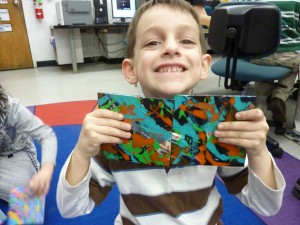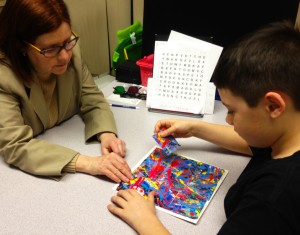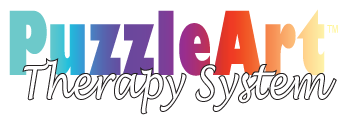Rewire Your Brain for Success!
Do you remember the artsy kid in high school, sporting their paint-splattered clothes, Doc Martens, and bulging portfolio? Maybe you were that kid, or maybe you wanted to be that kid, but you felt you didn’t have a creative bone (or brain) in your body. Or maybe you sat in geometry class, hearing about how angle A was congruent to angle B, but not comprehending the material at all as you sat there convinced that you couldn’t master the subject because your brain just didn’t work that way.
 But what if you were wrong? What if you could rewire your brain? How might your life have changed if you had just been told that your brain is not locked in a set state, that it can grow and change? If you had known that you could optimize your brain’s organization for better learning, would it have altered your success in school, or even your direction in life? Maybe, or maybe not. But now students can have that card in their back pocket, or their front parietal lobe.
But what if you were wrong? What if you could rewire your brain? How might your life have changed if you had just been told that your brain is not locked in a set state, that it can grow and change? If you had known that you could optimize your brain’s organization for better learning, would it have altered your success in school, or even your direction in life? Maybe, or maybe not. But now students can have that card in their back pocket, or their front parietal lobe.
Brain plasticity is one of the most exciting recent discoveries of neuroscience – and one with tremendous promise of real-world application. Brain plasticity refers to our brain’s ability to change and adapt in response to experiences. That is, we can provide our brains with learning opportunities that will force our brains to grow. As we strengthen our neural networks, we will thereby increase our memory, cognitive functioning, reasoning, and problem solving abilities. Our brains are not fixed, our intelligence is not set in stone! We can use the knowledge that our brains are malleable to change our neural wiring – but how can you rewire your brain?
It turns out that one of the easiest ways to improve student outcomes in the classroom is to teach students that learning can change their brain, then give them the cognitive strategies to make that happen. When students realize that learning can alter both the structure and function of their brain, they gain a measure of control and personal ownership over their learning and their brain function. Using their cognitive and metacognitive toolboxes, students hammer away on learning and learning to learn, building a better brain in the process, and experiencing academic success as a result.
Improving those neural pathways can improve our brain function. For example, researchers found that boys whose brains better integrated both their left and right sides showed specific giftedness in mathematics. Activities that engage different areas of the brain help us to problem solve in new ways and allow us to see the world through a new lens. Through those new neural networks, you are able to rewire your brain.
PuzzleArt Therapy uses a holistic integrative approach to help people improve their brain. This interactive art form utilizes brightly colored and highly textured PuzzleArt squares, and it provides participants with a hands-on experience that engages their mind and builds imagination. Participants explore new ways to problem-solve, and the activities help with memory, tracking, focus, and concentration. Practicing these skills in a fun, supportive, and creative environment helps build and reinforce those neural networks that are so vital to optimizing our brain functions! As students touch the pieces, explore their contours, and arrange and rearrange the pieces to form a multitude of solutions, they also create new, original art. The production of visual art is known to cause changes in our brains, and providing our brains with new experiences is exactly what helps develop neural connectivity and will help you rewire your brain.

Student works on PuzzleArt Therapy Challenge Grid perceptual, oculomotor and sensory activities with behavioral optometrist, Susan Fisher, OD.
We are seeing more and more that we have an integrated neural architecture, a large-scale brain network that is crucial for complex problem-solving. Training to rewire your brain in different modalities of reasoning improves our cognition, and acknowledging that our brain can change and focusing on how to make those changes, as simple as that sounds, can result in great strides – short-term academic advances or long-term life benefits!
“There is a growing body of evidence in scientific and medical literature showing that ‘brain exercise’ improves a person’s learning ability, memory, and mental quickness.”
—Robert Goldman, M.D., Ph.D., D.O., FAASP Chairman (WorldHealth.net) from his book, Brain Fitness
- Alli Berman is a Brain Fitness expert and the Eye Brain Fitness Guru. She has been an artist, author, educator, creativity consultant, workshop leader, perceptual and sensory products and programs developer, and motivational speaker for the past 30+ years. Berman has served as an educational advisor to the American Academy for Anti-Aging Medicine for over 30 years, and she is the founder of The Art of Rehabilitation and Anti-Aging Art. She created the PuzzleArt Therapy System in collaboration with behavioral optometrist, Susan Fisher, OD, and through consultation with neuroscientists around the world. Berman uses the system herself on a daily basis to keep her own brain as healthy, engaged, and challenged as possible!
